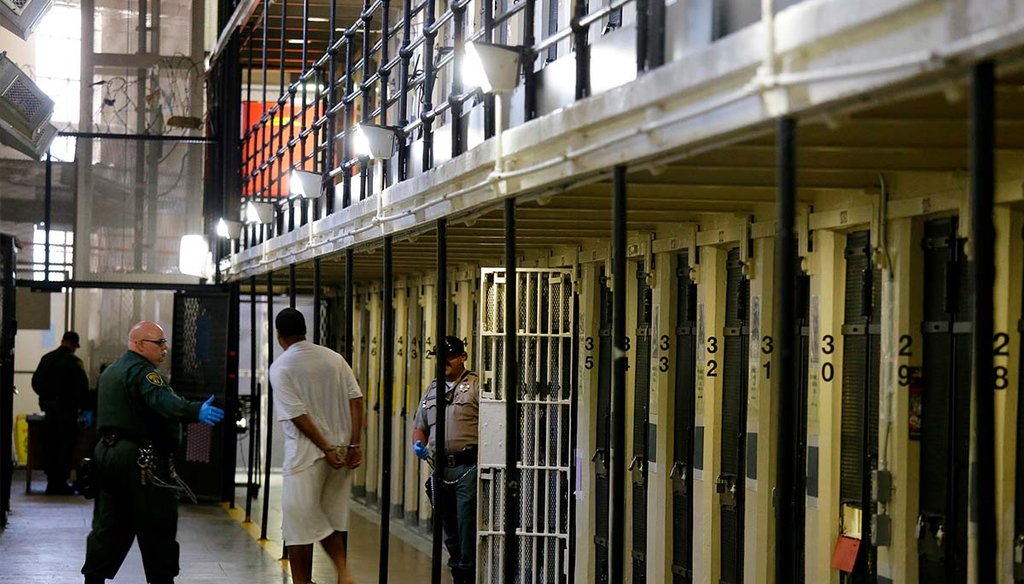

Our only agenda is to publish the truth so you can be an informed participant in democracy.
We need your help.


An inmate is led out of his block cell Aug. 16, 2016, at San Quentin State Prison, in San Quentin, Calif. (AP)
• One study did find the ratio Tonko cited, but that research has limitations, especially the age of its data, which is more than two decades old.
• A more recent study found ratios that were lower: from 40 to 74 times higher.
• Regardless of the precise ratio, both studies show a significantly elevated risk of drug overdose for people recently released from incarceration.
A bipartisan group of House members worked together recently to introduce the Reentry Act, which aims to ease the reentry of people who are released from incarceration.
On March 30, Rep. Paul Tonko, D-N.Y., issued a press release supporting the bill. The release touted the backing of Rep. David Trone, D-Md., and Reps. Mike Turner, R-Ohio and John Rutherford, R-Fla., and Sens. Tammy Baldwin, D-Wis., and Mike Braun, R-Ind.
Tonko boldfaced one statistic for emphasis: "Individuals released from incarceration are 129 times more likely to die of a drug overdose during the first two weeks after release." The release called this "alarming."
When we examined this statistic, we found evidence to support it — but with important caveats.
Tonko’s office pointed us to a study published by seven medical doctors and doctorate holders in the New England Journal of Medicine. The study — "Release from Prison: A High Risk of Death for Former Inmates" — found that overdoses were the most common cause of death for people leaving the prison system, greater than such other causes as gun violence or violent crime.
Specifically, the authors found that the risk of death from overdose was 129 times higher for people in the first two weeks after release, compared with the rate for the general public.
This data supports Tonko’s assertion. But there’s a catch.
The study is old, published in 2007 and using data from 1999 to 2003.
Also, the authors caution that their paper addressed Washington state and cannot necessarily be applied to the nation as a whole.
"Our study was based in a prison system in a single state in the United States, so we cannot be certain that the findings are generalizable to other correctional systems, states, or countries," the authors wrote.
The authors also noted that recordkeeping limitations can make it difficult to distinguish among deaths by accidental overdoses, intentional suicides and health problems.
We did find one additional study published in 2018 that is broadly on point, however.
In the paper, published in the American Journal of Public Health, seven academics studied data for North Carolina from 2000 to 2015. They found that two weeks after release, the risk of an opioid overdose death was 40 times higher than for North Carolina residents generally, and the risk of a heroin overdose after two weeks was 74 times higher.
Those are smaller ratios than the earlier study found, but they are still substantially higher than overdose death rates for the public at large.
Richard Rosenfeld, an emeritus criminology professor at the University of Missouri-St. Louis, told PolitiFact New York that both studies track with the general academic consensus that drug overdoses surge for people in the days after they’re released from prison.
Tonko said that people "released from incarceration are 129 times more likely to die of a drug overdose during the first two weeks after release."
One study found that ratio, but that research has limitations, especially the age of its data, which was collected more than two decades ago.
A more recent study found ratios that were lower than what Tonko said: from 40 times to 74 times higher, rather than 129 times.
Ratio differences aside, both papers show a significantly elevated risk of drug overdose for people recently released from prison. We rate this statement Half True.
Paul Tonko, Press Release, March 10, 2023
Congress.gov, Reentry Act
Ingrid A. Binswanger, Marc F. Stern, Richard A. Deyo, Patrick J. Heagerty, Allen Cheadle, Joann G. Elmore, and Thomas D. Koepsell, "Release from Prison — A High Risk of Death for Former Inmates" (New England Journal of Medicine) Jan. 11, 2007
Shabbar I. Ranapurwala, Meghan E. Shanahan, Apostolos A. Alexandridis, Scott K. Proescholdbell, Rebecca B. Naumann, Daniel Edwards Jr, and Stephen W. Marshall, "Opioid Overdose Mortality Among Former North Carolina Inmates: 2000–2015" (American Journal of Public Health), September 2018
National Academies, "The Limits of Recidivism: Measuring Success After Prison," 2022
Email interview with Richard Rosenfeld, emeritus professor of criminology at the University of Missouri-St. Louis, April 22, 2023
In a world of wild talk and fake news, help us stand up for the facts.
